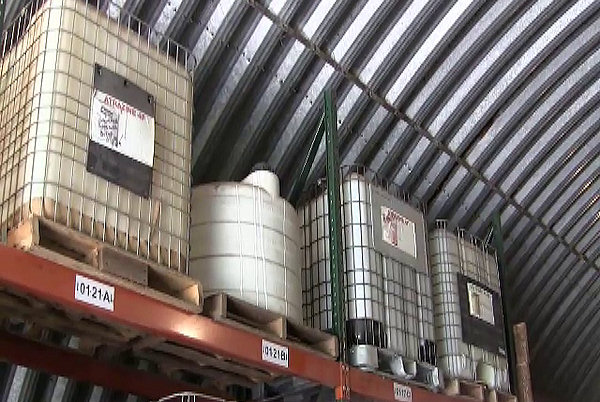July 1, 2013

As farms have gotten larger so has the equipment used to spray, plant, till and harvest those acres. The move to new kinds of containers for delivering everything from seed to crop protection products has changed as well. The days of the 2.5-gallon jug of crop chemicals is a rare site on a lot of farms, but the rise of mini-bulk, or caged tank, containers creates new issues.
The presence of those empty tanks offer a subtle reminder of piles of empty 2.5 gallon containers that used to line roadside ditches near farms. Those containers gave non-farm consumers the idea that farmers were creating a lot of plastic waste and possibly contaminating streams and lakes. It's an image the industry got away from with the use of larger container and thanks to cooperation and support of ag industry groups, you don't see piles of those containers anymore.
The Pesticide Stewardship Alliance, a volunteer ag industry group made up of concerned individuals, manufacturers, retailers, recycling contractors and regulatory experts is stepping up to take on the issue of recycling those larger caged-tanks to move those off farms.
There's a proper method for cleaning out those tanks - much like there's a triple-rinse procedure for those old 2.5-gallon jugs. Educating growers about the proper methods of rinsing and recycling caged tanks, or mini-bulk containers, is the focus of a free webinar being sponsored by TPSA and its industry partners.
Rinsing and Recycling Caged Tanks is scheduled for 2 p.m. Eastern Daylight Time, July 10. You can register for the webinar online.
A diverse group of speakers will be on hand for the webinar including:
* Ples Spradley, teaching/Extension specialist, University of Arkansas
* Nancy Fitz, Office of Pesticide Programs, U.S. Environmental Protection Agency
* Scott McPheeters, corn producer, Gothenburg, Neb.
* Bryan Gran, vice president, business development, FarmChem
At the University of Arkansas, Spradley coordinates the Pesticide Safety Education Program where about 1,500 commercial applicators are trained on pesticide usage and safety; and 4,000 private applicators are certified every year using the materials and equipment he provides.
A chemical engineer at EPA, Fitz has worked on policies and regulations regarding pesticide containers, containment, disposal, storage and transportation for more than 23 years including the August 2011 Pesticide and Containment Rule.
McPheeters, a TeamFIN member, has been rinsing and recycling IBC containers for more than 10 years. He farms with his father and two sons in central Nebraska. Most of the ridge-till corn he raises is center pivot irrigated and along with field corn they raise food-grade yellow and white corn, and popcorn. He designs and builds some of his own equipment, and does maintenance and most repair work in the McPheeters farm shop.
Gran is chairman of the board of TPSA, and throughout his career has worked for crop protection product manufacturers, equipment manufacturers, recycling industry and equipment distribution firms for more than 26 years. FarmChem is an industry leader in the design, manufacture and distribution of bulk and mini-bulk systems, including caged tanks, tank monitoring systems and accessories.
Webinar sponsors include Bayer CropScience, IBC North America, Interstate Ag Plastics, Monsanto, NCG, TankLink and TPSA. The webinar is brought to you by Farm Press and Penton Marketing Services. For more information about the speaker presentations and webinar visit www.TPSAlliance.org.
You May Also Like




